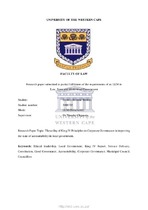| dc.description.abstract | Local government is often described as the cornerstone of democratic government and it is the
level or sphere of government that is physically closest to the people.1 As a result, local
government tends to have the most interaction with the citizens compared to other governments
organised at higher levels. In many countries, local government renders essential public
services that are needed for both human survival and economic development.2 These include
the supply of water and electricity, refuse removal, the provision of sanitation and housing, the
regulation of land use, and the provision of health services. In South Africa, the Constitution
of the Republic of South Africa, 1996 (Constitution) does not only position local government
at the centre of public service delivery, but also has broader developmental duties. | en_US |

